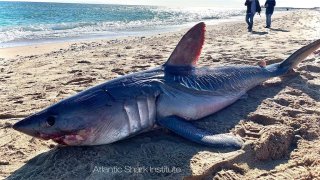
“I saw it on the beach and thought, ‘Oh, that’s something different,’” Corey Favino, of Rhode Island, said.
Favino was enjoying a walk on the Watch Hill beach on Wednesday when an unexpected sighting stopped him in his tracks.
WATCH ANYTIME FOR FREE
>Stream NBC10 Boston news for free, 24/7, wherever you are. |
“I went over to investigate, get a closer look and realized it was a shark,” Favino said.
After calls to Mystic Aquarium, who later contacted the Atlantic Shark Institute in Rhode Island, experts identified the species as a porbeagle shark, a species often confused with other mackerels like the great white shark.
Get updates on what's happening in Boston to your inbox. Sign up for our >News Headlines newsletter.
“We’ve got a mature porbeagle and those are endangered in the northwest Atlantic. Up here in our area, they’re endangered and it could also be pregnant, so it changed very quickly in terms of the value we might be able to extract from an unfortunate situation,” Atlantic Shark Institute Executive Director Jon Dodd said.
Dodd was among the team who carried the shark away to their lab for further testing. He said this particular find was especially notable.
“It’s really important because when you’ve got these sharks, particularly in the endangered category and you have one that would appear to be healthy and at a stage when she could actually be pregnant-- ‘Hey, why did this thing die?’” Dodd said.
U.S. & World
With the shark now frozen and soon to undergo a necropsy, those are some of the questions Dodd and his team will look to answer.
“To really understand the baseline of their anatomy and what makes a shark a healthy shark, most of that research comes from deceased specimens, sometimes acquired from tournaments or fisherman, or in this case, a specimen that’s washed up on shore,” Keith Cowley, shark historian at the Living Sharks Museum and researcher at Mystic Aquarium, said.
In terms of research, Dodd said the situation provides a rare opportunity to study a shark population that less than 10 years ago saw a near 90% decrease in certain areas, according to the National Oceanic and Atmospheric Administration.
“Seeing sharks, the presence of sharks usually means a healthy ecosystem, so it’s certainly beneficial for the public to know that sharks are here, and maybe our ecosystem is thriving,” Cowley said.
As an endangered species, porbeagles, like great whites, have been protected by the government for decades.
They may look similar, but both Dodd and Cowley said the porbeagle’s habits are different.
“Very closely aligned between those two, but really nothing for people to worry about unless you feel like taking a swim in really cold water number one, number two, they really like deeper water so not a shark that interacts with humans very much at all,” Dodd said.
He added that shark activity in New England differs based on a variety of factors including type of shark, time of year and specific region.
“I wouldn’t have a problem swimming in Long Island or Rhode Island or Connecticut, southern New England, but in the Cape, I’d be very careful if I were in the Cape during the summer months based on the amount of activity that’s going on there,” Dodd said.



